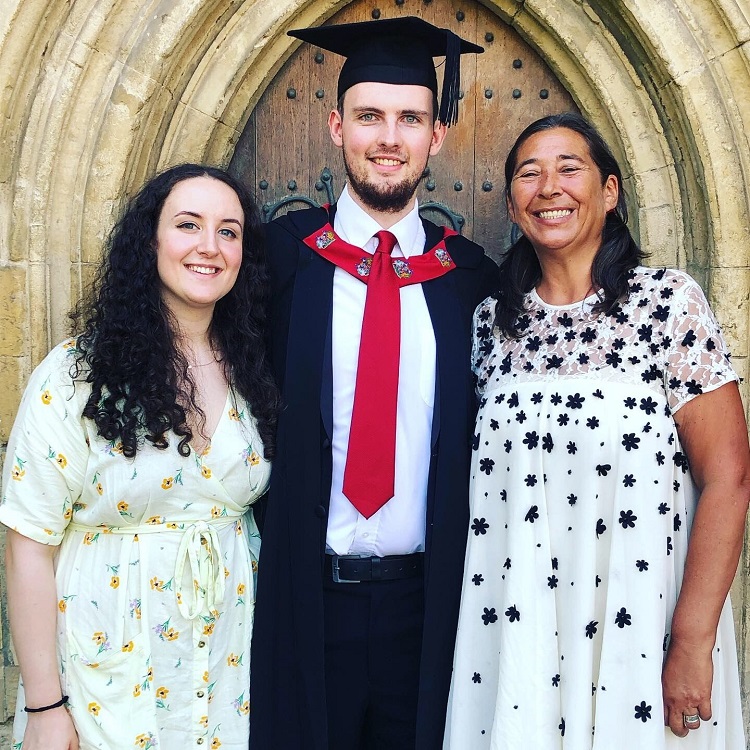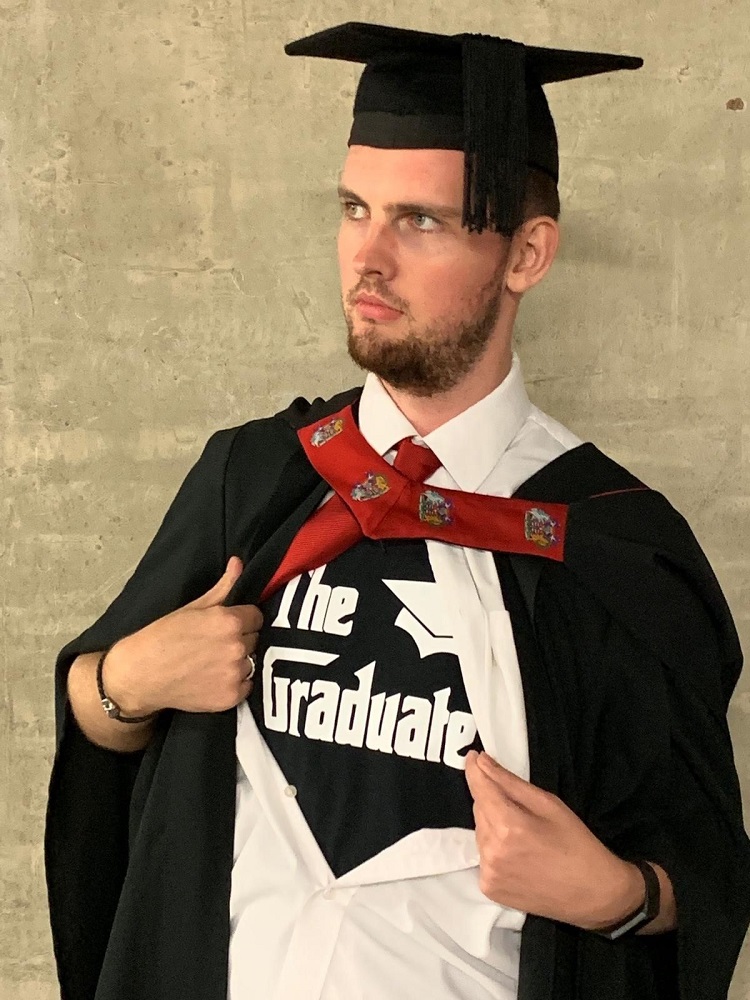Bradley Cory dreamed of becoming a commercial airline pilot, but a life-changing incident that happened when he was just 16 forced a total reassessment of his future. Obtaining his first degree at the University of Greenwich and working on his PhD with NRI, Bradley is forging a new career coupled with a desire to ‘give something back’. Bradley took five minutes out of his day to chat with NRI Communications Officer, Linden Kemkaran, about his life and goals.
I was born in South Africa in a little town called Springs, about an hour away from Pretoria and I imagine my childhood was quite different to a UK childhood. I came to the UK when I was 11 as my older sisters already lived here, and my mum and I wanted to join them.
I remember when I was little, I wanted to become an airline pilot, or a rubbish collector – quite different ambitions! But as I matured, the pilot dream stayed, so I chose to study maths, physics, chemistry, and IT for my A Levels, with the intention of then training with an airline.
But life threw me a curveball and just a few days before starting 6th form, I suffered a stroke and a massive brain haemorrhage which left me very weak down my left-hand side. It came out of nowhere and I subsequently found out, was due to an AVM – an arteriovenous malformation – where the blood vessels connecting arteries and the brain become tangled.
I was in hospital for four months, before going into a specialist rehabilitation centre at The Children’s Trust in Tadworth, Surrey for about three more months where I had world-class, full-time therapy.
I eventually recovered enough to think about restarting my A levels but the school was reticent to have me back, as they’d never had to think through the implications of taking on a partially paralysed student before. I remember there were concerns about what would happen in the event of fire. Would I get out? Who would help me get out? Would I hamper the safety of those around me? I kept coming up with practical solutions and eventually the teaching staff were happy to have me back.
paralysed student before. I remember there were concerns about what would happen in the event of fire. Would I get out? Who would help me get out? Would I hamper the safety of those around me? I kept coming up with practical solutions and eventually the teaching staff were happy to have me back.
Clearly the extent of my physical disability meant I had to let go of my dreams of flying planes, but I suddenly had a desire to give something back to the profession that had helped me so much after my stroke, and I resolved to become a physiotherapist instead.
I chose maths, biology, psychology and IT – but the maths just wasn’t working out for me anymore, so I had to drop that and concentrate on the other subjects. When my exams were over, I took a year out to keep my recovery going and I did some volunteering at the Princess Royal Hospital, in Farnborough in Kent, on the stroke ward. I spoke with patients and tried to help them with what they were going through.
It was a bit strange, as I was a stroke survivor also, but I was generally a lot younger than the people I was helping. It was during this time that I realised that my real passion lay in research, rather than in a more ‘hands-on’- career, so I looked for biology degrees.
The University of Greenwich appealed to me as it was quite local to where I lived and, as luck would have it, they were just finalising a new foundation four-year programme in biology, which included a chemistry element, which I needed, but lacked.
 The biggest factor in my being able to study successfully at Greenwich was the existence of the STAART (Support Through Accessibility: Retention and Transition) programme, an initiative which supports students who have a disability, a long-term health condition, a specific learning difficulty and/or mental health conditions. This was a game-changer, as knowing that I would be supported with my disability meant that suddenly there were fewer barriers to studying. In my opinion, STAART is one of the most under-appreciated resources that the University has, and I know for a fact that it’s been a key factor in encouraging other disabled students to continue into Higher Education.
The biggest factor in my being able to study successfully at Greenwich was the existence of the STAART (Support Through Accessibility: Retention and Transition) programme, an initiative which supports students who have a disability, a long-term health condition, a specific learning difficulty and/or mental health conditions. This was a game-changer, as knowing that I would be supported with my disability meant that suddenly there were fewer barriers to studying. In my opinion, STAART is one of the most under-appreciated resources that the University has, and I know for a fact that it’s been a key factor in encouraging other disabled students to continue into Higher Education.
I could see opportunities everywhere I looked at Greenwich. For example, I applied for the Vice Chancellor’s scholarship and won it for ‘developing the community around us’, and I went on to set up the Well-being Society with the Greenwich-Kent Students’ Union. I graduated in 2019 with a first-class honour’s degree in biology and began thinking about what would come next.
I’m not going to pretend any of this was easy. I had to work very hard and constantly overcome people’s perceptions of me as a disabled person. All my lecturers were great in that they were available outside the classroom to chat or just chuck ideas around with me.
Dr Joshua Boateng, now Professor Boateng, was incredibly helpful when I talked to him about going on to do a Master’s by Research (MRes) and he said that he thought I could be PhD material. I applied and started my PhD in wound healing using natural materials almost two years ago.
As things take me a bit longer than other people, I’m doing my PhD over four years, so I’ve had to self-fund so far – a situation I’m always hopeful will change. As a disabled person, I’m always looking at how to change things so that other people will also benefit, not just me. The pandemic demonstrated just how possible it is to work flexibly for many of us, and it’s also shown that people can be judged by productivity rather than presenteeism.
I’m coming up to the ten-year anniversary of my stroke – my ‘survivor day’ as I like to call it – and it’s made me realise that until you’re in a tricky situation you can’t know what it’s really like. Being part of the disabled community has made me very aware; I’ve had to grow up fast. We are the world’s largest minority and I’ve realised that things that benefit us – take subtitles for example – can benefit huge numbers of non-disabled people too. We are worth investing in.
I run a business called ‘Barrier-Free world’, that is designed to combat the so-called ‘disability tax’ which is a premium charged by companies for services and products for disabled people. I won a Social Enterprise Challenge prize for this in 2021 – it’s good to be recognised.
I don’t see myself as a stroke victim, but as a survivor. It sucks to be disabled – I’ll be honest; however, being disabled has given me a perspective that others do not have. I have an education and I’m continuing to do the things that people tell me I can’t. I hope that I can be someone who is actively demonstrating every day, that great things are possible.
I may never get to be that airline pilot that I dreamed of as a kid, but I’d like to go on to develop my business. I’d like to progress more in academia and research, maybe do some teaching around the world, and continue fighting for disability rights, but I don’t know where life is going to take me – and that’s absolutely fine.
To find out more about:

